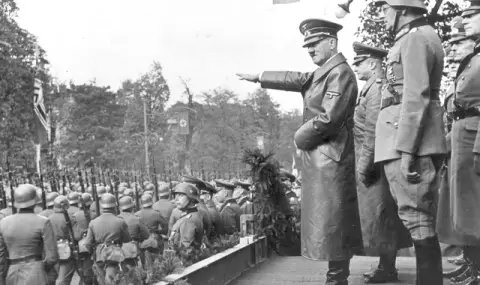4,000 municipalities in Germany once made Adolf Hitler an honorary citizen. After his death, this title was dropped, but many have not distanced themselves from it to this day. Students from a town near Bonn are fighting against this.
The 10th graders from the high school in Bad Honeff, near Bonn, have been captivated by the idea of writing history for several weeks. And to make sure the town of 25,000 officially parted ways with its famous honorary citizen, Adolf Hitler. The students, along with their teacher Thomas Roth, want to send a clear message against far-right ideas, albeit decades later. "We live in this city, so its history naturally interests us. We asked ourselves whether today with our influence we could not change something in history and Hitler's honorary citizenship, which is why each of us sent an email to the mayor", the initiators told DV.
In the end, over 1,363 citizens of Bad Honeff signed the proposal - five percent of the population, which is the minimum necessary for the initiative to be considered in the city council. The students are very satisfied with the success achieved. "Most of the people we spoke to had no idea that Hitler was an honorary citizen of Bad Honnef. Many signed immediately. If someone had told us a year ago that we could achieve something this big, we wouldn't have believed them. But recently there are more and more right-wing extremists - especially in the social circles - and this must be fought against."
Thousands of German cities are proud of their honorary citizen Hitler
Bad Honeff made Adolf Hitler its honorary citizen on April 5, 1933 - a month after the victory of the National Socialists in the Reichstag elections. The small town by the Rhine was one of the first to award this title to Hitler - by 1934 there were a total of 4,000.
After Hitler's suicide on April 30, 1945, his title of honorary citizen was automatically revoked, but in Bad Honnef, for example, it has not been symbolically taken away from him to this day. To DV, the teacher Thomas Roth says: "Within our research, we found, along with Hitler's letter of thanks, a protocol from a city council meeting from 1983. The predecessors of today's Green Party had tabled a motion that was never put to a vote. This prompted us to act".
The students' initiative immediately received support. Mayor Otto Neuhoff does not hide his joy at the initiative: "We are proud of the students because this initiative is truly wonderful. They have realized that they can influence politics. And they learned, precisely in view of the last elections in East Germany, that you have to be active".
Distancing from Hitler takes place in three stages
In recent years, many German municipalities have distanced themselves from Hitler as their honorary citizen - mostly as a signal against the societal and political turn to the right. The process takes place in several waves, historian Thomas Schlemmer tells DV. The first begins immediately after the end of World War II, and one of the first cities to take away Hitler's title is Kiel.
In post-war times, the anti-National Socialist impulse was very strong, but then there was a reversal in Germany related to perpetrator-victim relations. Many of the individuals responsible for the atrocities during Nazism suddenly began to see themselves as innocent victims forced by the Nazis to do things they did not want to do. And Germany temporarily "freezes" rethinking your story.
"In the 1970s and 1980s, the thesis was - Hitler's honorary citizenship ended with his death, the question is no longer relevant. At the same time, however, the confrontation with the Nazi past received a new impulse in January 1979 with the broadcast of the American series about the Holocaust - it generated a very strong interest in the times of National Socialism."
Important token step to get started
In this period of 40 years also falls the first unsuccessful attempt of Bad Honeff to distance himself from his honorary citizen, Adolf Hitler. But now, 91 years after the title was given, the city really wants to close this not particularly worthy chapter of its history.
According to Thomas Schlemmer, this is a belated step of great symbolic importance - an expression of a process that is underway throughout Germany. However, he emphasizes that it is even more important to consider what follows in the present: "What has led to the collapse of democracy? What lessons can be learned if we have to defend democracy again today? Such acts of symbolic distancing are a great chance, beyond the issue of Hitler's honorary citizenship, to engage more intensively with the history of our cities in the period between 1930 and 1950.
